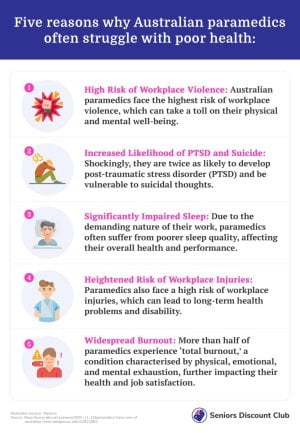Saving lives, facing struggles: Paramedic speaks out about the new retirement age
- Replies 22
Here at the SDC team, we truly understand the importance of maintaining an active and fulfilling career throughout life. Not only does it bring personal satisfaction, but it also provides a sense of financial security.
Many retirees were left feeling disappointed when they found out that the pension eligibility age was raised to 67 starting July 1 this year. This decision sparked outrage among various trade industry groups.
While some may have the luxury of having a few years or decades ahead before retirement becomes a concern, certain professions heavily rely on physical stamina and a dedicated, hardworking attitude.
For individuals in these fields, increasing the retirement age can mean facing more back-breaking and labour-intensive years ahead.

Paramedic Gary Wilson, 51, is an example of someone who’s already been in the job for nearly two decades yet is nowhere close to the latest retirement age of 67. And it’s safe to say that the physical and mental stress of being a first responder is taking a toll on him.
'It’s more and more unusual for paramedics to reach retirement because it’s getting harder and harder,' Wilson, a delegate of the Australian Paramedics Association (APA), told a news outlet.
'Most paramedics are leaving the career well before retirement age, and increasing the retirement age is forcing more and more of us to make really tough choices.'
The risks associated with being a first responder are well-documented.
A study conducted in 2014 found that paramedics have the highest injury and fatality rate among all Australian workers, with the risk of serious injury being seven times higher than the national average.
Shockingly, they are more than twice as likely to be injured on the job compared to police officers and are at a significantly higher risk of facing assault during their duties.
To make matters worse, first responders also face considerable mental health risks.
Government studies reveal that those in the emergency services have twice the likelihood of being diagnosed with post-traumatic stress disorder (PTSD) than the general public.
As much as we appreciate and rely on the dedication of these brave individuals, it's crucial to be aware of their challenges and provide them with the support they need to cope with the demands of their vital roles.
Sadly, these issues aren’t worked out in a few months; the physical and emotional stress associated with being a first responder can take a significant toll and render someone incapable of doing their job after years of service.
And that’s what Wilson fears might happen—that the stresses of the job could soon take a toll on him and force him to make a heartbreaking decision to leave before he can even retire.
'It’s a hard job, physically and mentally,' he said.
'In NSW, as a 60-something-year-old paramedic, you’re expected to do the same job as a 20-something-year-old paramedic with years of trauma and stress under your belt.'
What's more, Wilson fears that the increase in retirement age isn't only bad for those currently on the job but could have serious repercussions on the paramedics that come after them, as it could lead to those in the profession leaving before they're eligible for a pension.
'It means I’ve got to leave a job I love to look for something else. And the problem with that is we all know how hard it is for people to find work when they’re in that pre-retirement phase,' he explained.
'So we (paramedics) spend decades serving the community and being broken by our employer, and then we’re virtually thrown to the scrap heap and replaced with someone else.'

The work carried out by paramedics, police officers, and other emergency service personnel is vital and demanding. Unfortunately, it is often underappreciated and goes unnoticed.
At the SDC, we recognise the value of our first responders and their significant contributions to our society. We sincerely hope that all of these brave individuals can retire with the security and peace of mind they rightfully deserve.
We would love to hear your thoughts on this subject matter. Have you had any personal experiences with first responders or paramedics? Feel free to share your stories and experiences with us in the comments below!
Many retirees were left feeling disappointed when they found out that the pension eligibility age was raised to 67 starting July 1 this year. This decision sparked outrage among various trade industry groups.
While some may have the luxury of having a few years or decades ahead before retirement becomes a concern, certain professions heavily rely on physical stamina and a dedicated, hardworking attitude.
For individuals in these fields, increasing the retirement age can mean facing more back-breaking and labour-intensive years ahead.

An Aussie paramedic does not think he will make it to the new, higher pension age before he “breaks”, and he says he is not alone. Credit: Shutterstock.
Paramedic Gary Wilson, 51, is an example of someone who’s already been in the job for nearly two decades yet is nowhere close to the latest retirement age of 67. And it’s safe to say that the physical and mental stress of being a first responder is taking a toll on him.
'It’s more and more unusual for paramedics to reach retirement because it’s getting harder and harder,' Wilson, a delegate of the Australian Paramedics Association (APA), told a news outlet.
'Most paramedics are leaving the career well before retirement age, and increasing the retirement age is forcing more and more of us to make really tough choices.'
The risks associated with being a first responder are well-documented.
A study conducted in 2014 found that paramedics have the highest injury and fatality rate among all Australian workers, with the risk of serious injury being seven times higher than the national average.
Shockingly, they are more than twice as likely to be injured on the job compared to police officers and are at a significantly higher risk of facing assault during their duties.
To make matters worse, first responders also face considerable mental health risks.
Government studies reveal that those in the emergency services have twice the likelihood of being diagnosed with post-traumatic stress disorder (PTSD) than the general public.
As much as we appreciate and rely on the dedication of these brave individuals, it's crucial to be aware of their challenges and provide them with the support they need to cope with the demands of their vital roles.
Sadly, these issues aren’t worked out in a few months; the physical and emotional stress associated with being a first responder can take a significant toll and render someone incapable of doing their job after years of service.
And that’s what Wilson fears might happen—that the stresses of the job could soon take a toll on him and force him to make a heartbreaking decision to leave before he can even retire.
'It’s a hard job, physically and mentally,' he said.
'In NSW, as a 60-something-year-old paramedic, you’re expected to do the same job as a 20-something-year-old paramedic with years of trauma and stress under your belt.'
What's more, Wilson fears that the increase in retirement age isn't only bad for those currently on the job but could have serious repercussions on the paramedics that come after them, as it could lead to those in the profession leaving before they're eligible for a pension.
'It means I’ve got to leave a job I love to look for something else. And the problem with that is we all know how hard it is for people to find work when they’re in that pre-retirement phase,' he explained.
'So we (paramedics) spend decades serving the community and being broken by our employer, and then we’re virtually thrown to the scrap heap and replaced with someone else.'
Key Takeaways
- An Australian paramedic, Gary Wilson, voiced concerns that he and others may not reach the new pension eligibility age before being worn out by the physical and mental demands of the job.
- The rise in the pension eligibility age to 67 for Australians born after 1956 has triggered widespread concerns among many industry groups.
- According to data, paramedics are at a higher risk of serious injury and mental health conditions than many other professions.
- Mr Wilson fears the raised retirement age may result in the loss of experienced paramedics, who feel compelled to leave before reaching pension age due to the job’s demanding nature.
The work carried out by paramedics, police officers, and other emergency service personnel is vital and demanding. Unfortunately, it is often underappreciated and goes unnoticed.
At the SDC, we recognise the value of our first responders and their significant contributions to our society. We sincerely hope that all of these brave individuals can retire with the security and peace of mind they rightfully deserve.
We would love to hear your thoughts on this subject matter. Have you had any personal experiences with first responders or paramedics? Feel free to share your stories and experiences with us in the comments below!








